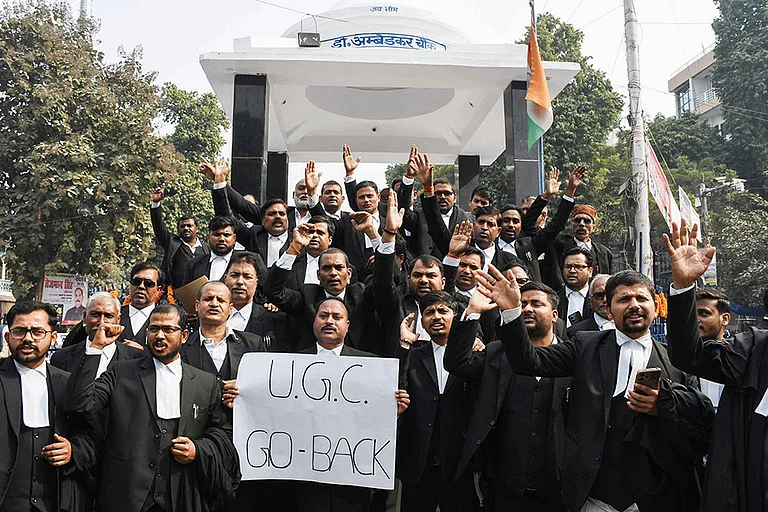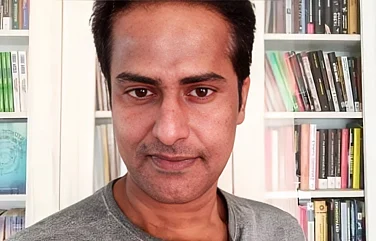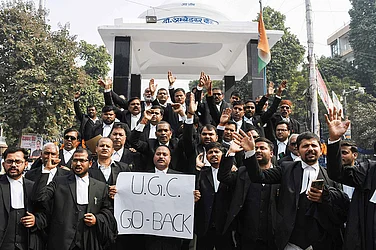As most parts of India seek a seamless supply of essential goods in the midst of the countrywide lockdown to fight COVID-19, the central question that assumes importance is – what are the conditions under which the labour force is meeting the demand of mass production and delivery at low costs?
The national lockdown came into effect on March 26, backed by health experts as a necessary step for containing the rapid spread of the virus. There are, however, consequences of the contagion that go beyond the health-related challenges, and raise, possibly, more long-term humanitarian concerns.
The huge number – over 39 crore – of unorganised and migrant workers on the fringes or outside the socio-economic security umbrella, are the most vulnerable. This makes them the easiest target for the organised crime network of human trafficking. Deprivation and hunger await them before and after they reach their villages across several states. They will be forced into debt and predatory interest rates even for their daily subsistence. This will trigger decades of inter-generational bondage and wage-less labour. Hundreds of thousands of children will be enslaved.
Once the lockdown is lifted and normal manufacturing activity resumes, factory owners will look to cover their financial losses by employing cheap labour. Increasingly, desperate and vulnerable populations of unorganised workers, who are in no position to negotiate wages or their rights, will be a massive pool for cheap labour.
A large number of these labourers will be children, forced out of school, bearing the burden of sustaining their families. Thousands of children will likely be trafficked across the country to work in manufacturing units where they will be paid meagre to no wages and will most likely face extreme physical, mental and sexual violence. Underage girls will be married and bought and sold into prostitution. According to government data (2007), there are at least 30 lakh women, including 12 lakh girls below the age of 18 years, involved in sex work. The forces behind the business of pushing girls and women into commercial sexual exploitation have faced 'financial loss' as a consequence of the lockdown will seek to overcome this loss through high-return investments, i.e. a girl from a family which has lost its means of subsistence and survival.
Pornhub, the largest pornography platform in the world, has seen a 20-time jump in India, from 0.9% on February 24 to 18.1% as on March 16. A large segment of this 'content' includes trafficked children who are exploited to create pornographic material. Adults and children who consume this content are likely to 'normalise and fetishise' child rape and sexual violence, which may translate into offline sexual violence.
Preparedness to counter bonded labour and trafficking
As the central and state governments struggle to contain the immediate health and economic challenges, a great amount of planning must go into dealing with the imminent impact of this crisis, especially in terms of the safety of the most vulnerable children.
1. Assessment and review of legal framework: The central government must assess the existing criminal law on trafficking and its ability to counter the crime and meet the needs of the victim. The lapsed anti-trafficking bill needs to be amended and passed in Parliament urgently.
2. Inspections of factories and manufacturing units: Small and medium business will try and operate through unregulated manufacturing units to subvert inspection and must be contained within the system of accountability. The enforcement and compliance of child labour and bonded labour laws will require increased focus, including extensive combing exercises of registered factories and other manufacturing units, for at least two years, to prevent the use of child labourers.
3. Increase in budgetary allocation for law enforcement and victim rehabilitation: There is a gross deficit in the budgetary allocation to combat bonded labour and trafficking. Up to 2016, 3.13 lakh bonded labourers have been rescued. The rehabilitation framework for rescued bonded labourers was strengthened in 2016, though, a central government scheme provides for compensation up to Rs 3 lakh to victims.
From the date of the notification of this scheme till December 2019, Bachpan Bachao Andolan, founded by Nobel Peace Laureate Kailash Satyarthi, has rescued 1,550 child bonded labourers and 2,823 child victims of trafficking. The rehabilitation of these children alone required a minimum of Rs 100.2 crore. Yet, the total allocation for the scheme in the national budget is only Rs 100 crore annually. This calls for an immediate hike, especially focused on the rehabilitation of rescued bonded labourers and trafficking victims.
4. Regulation of loan and moneylending systems: The disproportionate increase in the power of local moneylenders in rural India to exploit those affected by the lockdown needs regulation. This includes widespread licensing to lend, setting of ceilings on lending rates, government banks extending long-term soft loans without collateral, and simple and lenient recovery processes. State governments must also proactively issue immediate orders to end bonded labour.
5. Curbing the rise of online Child Sexual Abuse material: The upsurge of child sexual abuse material and its easy access can only be controlled by placing greater accountability on Internet Service Providers and digital platforms that host this content. They must be accountable to not only identify and remove content but also to trace its source and cooperate with the law enforcement to crack down on its supply and demand.
6. Spreading a wide safety net in source areas of trafficking: Schools, communities, religious authorities and the local administration need to recognise and control trafficking and bonded labour in villages. Intensive campaigns must educate communities about the threat and modus operandi of trafficking agents, especially in the source areas such as Jharkhand, Bihar, West Bengal, and Assam.
The railway and other transport facilities have to be intensely monitored. While on the one hand, awareness around existing government social welfare schemes and the means to access them should be generated, the government on its part must immediately initiate registration of unorganised workers. Special financial protection should be extended for the next year in order to keep the wolf away from the door.
The impending humanitarian crisis in the aftermath of the ongoing global health crisis is real. Our foresight and preparedness in the midst of the current lockdown can save the lives of crores of women, men and children and build a strong economic foundation of the economy. The value of human life and the collective effort to protect it goes beyond this temporary period of the lockdown.
(The writer is Director, Policy, at the Kailash Satyarthi Children's Foundation. Views expressed are personal.)





















